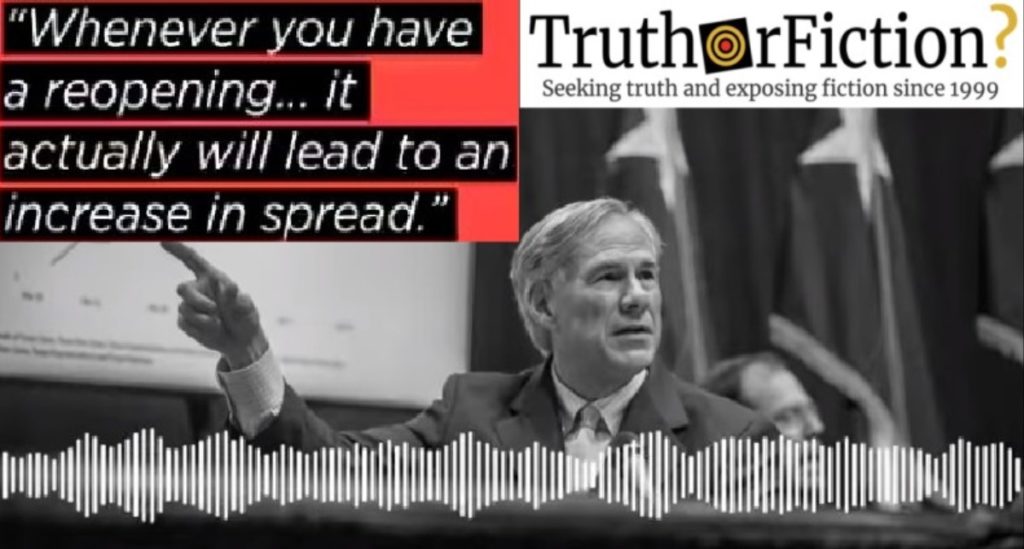In the middle of announcing his plan calling for workers to resume business amid the COVID-19 pandemic, Texas Gov. Greg Abbott was recorded admitting that he knew it would spur an increase in cases of the disease.
“How do we know reopening businesses won’t result in faster spread of COVID-19?” Abbott asked during a conference call with state lawmakers on May 1 2020 before adding:
Listen, the fact of the matter is, pretty much every scientific and medical report shows that whenever you have a reopening — whether you want to call it a reopening of business or just a reopening of society in the aftermath of something like this — it actually will lead to an increase in spread. It’s almost ipso facto — the more that you have people out there, the greater the possibility there is for transmission.
Abbott’s statement was first published by the political group Progress Texas on both Twitter and YouTube:
BREAKING: As @GovAbbott reopens the state in the midst of a rising infection and death rate, leaked audio from a call with Texas Legislators reveals that he knows reopening puts more Texans at risk. #txlege pic.twitter.com/kTK4M8gpSY
— Progress Texas (@ProgressTX) May 5, 2020
As the San Antonio Current reported, the audio was released as the Republican governor announced that hair salons would be allowed to reopen on May 8 2020. Ten days after that, said Abbott, fitness clubs would be allowed to reopen provided they stay at 25 percent capacity, but members would not be allowed to use their facility’s locker room or showers and equipment would have to be sanitized every time it was used.
Abbott can also be heard saying on the leaked audio:
The goal never has been to get transmission of COVID-19 down to zero. It never can be to keep transmission down to zero, because with a rapidly transmittable disease like this there will be always be a level of transmission. Even when you have an immunization come out, there will be a transmission rate for COVID-19. The goal is to reopen using strategies that can continue to contain the spread of COVID-19. These are strategies that have proven effective in Texas for the past month and a half.
A spokesperson for the governor, John Wittman, told the news site The Daily Beast that Abbott’s remarks on the call were in line with previous statements he had made to local news outlets.
“The governor has said this from the beginning, as we begin to open up, we will see flare ups, whether we open now or three months from now,” said Wittman. “The key is ensuring we are able to contain that spread, which is where contact tracing comes into play.”
However, Progress Texas pointed out that Abbott had minimized the prospect of an increase in COVID-19 cases in those interviews; on April 24 2020, he told KSAT-TV:
One thing that all scientists and doctors say is that as we do begin to open up, there could be an increase in the number of coronavirus cases. Two things about it. One reason for an increase is we are going to be doing more testing. We’ll be doing what’s called testing and tracing all across Bexar County to identify any types of hotspots. If there are hotspots where there is a sudden rise or increase in the number of people testing positive, we will provide all the medical care needed in order to quickly address it and to reduce it if it’s widespread.
That same day, he told KTBC-TV:
When you begin to reopen, there can be spikes or increases in those who test positive for COVID-19. This is nothing to be worried about, in part, because we will be doing far more testing in the future than we have in the past and that alone will identify more people testing positive. Our goal is to make sure that there are not any dramatic spikes that lead to increased hospitalizations or increased deaths.
The weekend after his conversation with lawmakers saw a sharp uptick in the number of COVID-19 diagnoses across the state: a combined 2,000 new cases were reported between May 2 and May 3 2020, a record increase for a two-day period. According to the Texas Department of State, 33,369 total cases have been reported as of May 5 2020, with 906 cases reported as fatal. An estimated 16,791 patients have reportedly recovered from the disease — while 15,672 cases are still listed as active.
- Texas Gov. Greg Abbott Caught on Recording Saying Reopening Will Increase Spread of Coronavirus
- Texas Governor Admits Dangers of Reopening State on Private Call With Lawmakers
- Leaked Audio (Full): Gov. Abbott Knows Reopening Will Cause an Increase in Infection Rate for Texans
- Texas Case Counts
- Governor Abbott Says Texas Will Expand Testing to Asymptomatic People Soon
- Governor Abbott Explains How We Will Reopen the Texas Economy Safely

